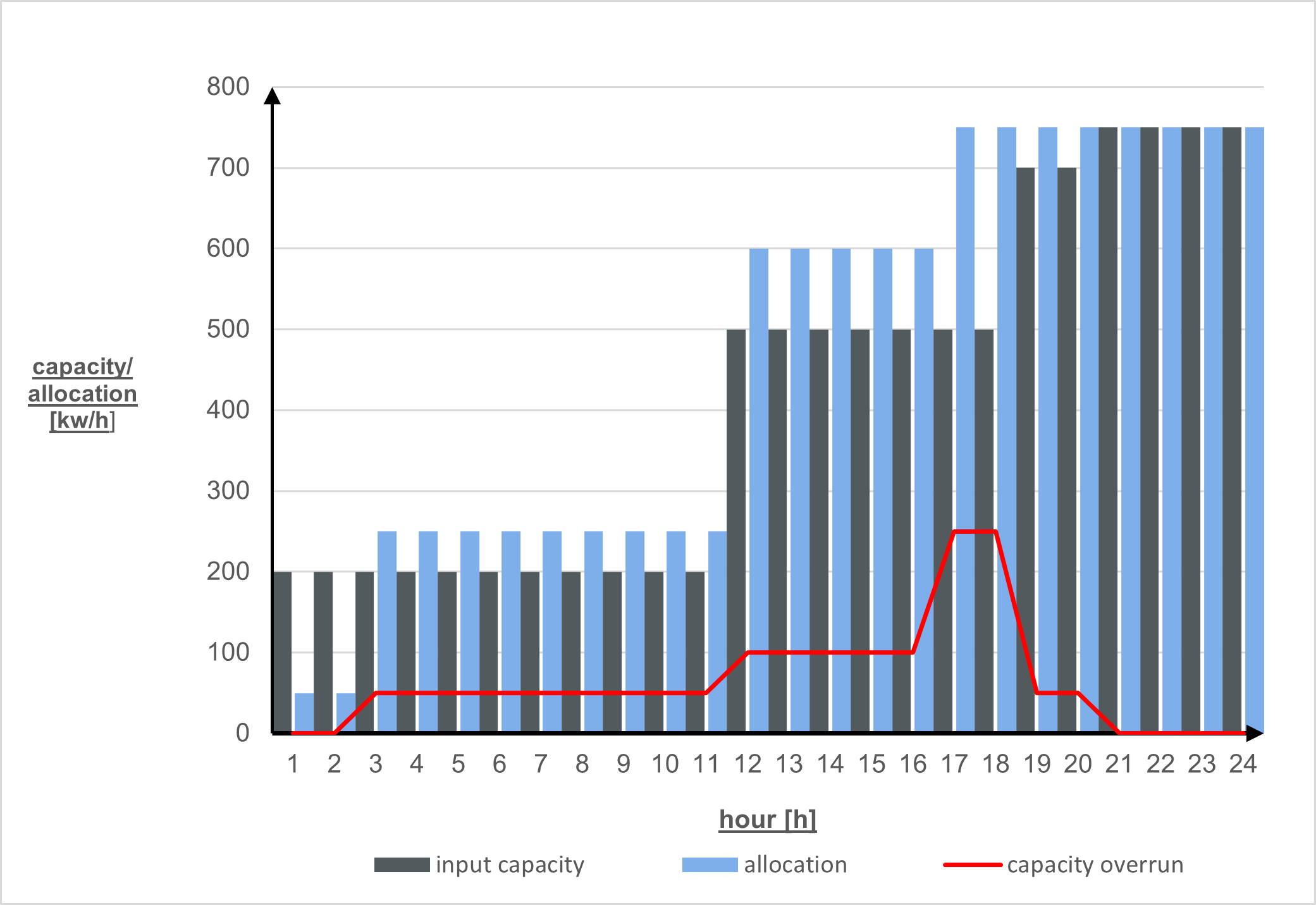FAQ Transport Customers
Questions and answers for our transport customers
Below you will find the answers to the most frequently asked questions to ONTRAS by their customers. For further questions please do not hesitate to contact us personally.
Capacity booking
Prerequisites for capacity booking with ONTRAS
Prerequisites for capacity booking at ONTRAS
The preconditions for capacity booking at ONTRAS can be found in the section Capacity booking.
How do you register for bookings in the ONTRAS grid?
The registration should be done online via the respective capacity booking platform:
- PRISMA: for all network points except the GCP GAZ-SYSTEM/ONTRAS - or/and
- RBP: for GCP GAZ-SYSTEM/ONTRAS.
More information about the registration process can be found in the section Capacity booking.
Which documents are necessary for registration?
- Form for registration on Capacity Booking Plattform
- Proof of authority to act on behalf of the company and audited annual financial statements according to our Network Access Conditions
- Data sheet bank details and tax ID
Please send the signed registration documents by e-mail to capacity@ontras.com.
Capacity booking
How are firm and interruptible capacities marketed at cross border points and storages?
The capacities at cross border points and at storages are allocated by an auction procedure. Auctions take place in accordance with European requirements on specific dates and for specific terms. The following dates currently apply for the specified terms:
For firm products
Duration
Year
Frequency
yearly
Products
Y1-Y15
Start of auction
1st Monday in July
Publication
4 weeks before auction start
Duration
Quarter
Frequency
rolling, quarterly
Products
Q4-Q3
Start of auction
1st Monday M-2
Publication
2 weeks before auction start
Duration
Month
Frequency
monthly
Products
M1
Start of auction
3rd Monday M-1
Publication
1 weeks before auction start
Duration
Day
Frequency
daily
Products
D1
Start of auction
16:30 D-1
Publication
16:30 D-1
Duration
Within-Day
Frequency
hourly
Products
Rest of the day
Start of auction
19:00 D-1*
Publication
19:00 D-1
* followed by every hour on the hour. Publication will take place at the start of the auction.
For interruptible products
Interruptible capacities for monthly, quarterly and annual products shall only be offered if the corresponding firm capacity products have been marketed with an auction premium, fully marketed or not offered (article 32 of EU CR 2017/459).
Duration
Year
Frequency
yearly
Products
Y1-Y15
Start of auction
3rd Monday in July
Publication
1 week before auction start
Duration
Quarter
Frequency
rolling, quarterly
Products
Q4-Q3
Start of auction
1st Monday M-1
Publication
1 week before auction start
Duration
Month
Frequency
monthly
Products
M1
Start of auction
4th Tuesday M-1
Publication
1 week before auction start
Duration
Day
Frequency
daily
Products
D1
Start of auction
17:30 D-1
Publication
17:30 D-1
Duration
Within-Day
Frequency
hourly
Products
Rest of the Day
Start of auction
**
Publication
-
** Allocation occurs by over-nomination from the time the network point is booked out in the respective direction.
How can capacities be acquired at the network point where the capacity allocation process is not an auction process?
Firm and interruptible capacities at grid points, where capacity is not allocated via auction (industrial customers, production and biogas facilities), are marketed via first-come-first-served (FCFS). At the connection points of this type bookings are possible up to 1 hour before the beginning of the contract.
Are capacities by ONTRAS offered as bundled capacities?
ONTRAS markets firm capacities as bundled capacities only at the cross border point GCP GAZ-SYSTEM/ONTRAS according to NC CAM. Interruptible capacities are not bundled.
Where do you find information about capacities and flows in the ONTRAS grid?
Free and booked capacities as well as physical flows at relevant network points are published in the transparency tool of ONTRAS.
Can interruptible capacities be converted into firm?
Interruptible capacities or capacities with interruptible parts can be upgraded into firm capacities or capacities with less interruptible parts during the bid submission in the auction process on PRISMA or RBP.
Can unbundled capacities been converted into bundled capacities?
At interconnection points unbundled capacities with a duration of a month or more can be converted into bundled capacities during the auction. The conversion function on the respective capacity booking platform can be used for this.
Does ONTRAS offer competing capacities?
No, there are no competing auctions for the ONTRAS grid.
What is the emergency process if bookings on the capacity booking platforms are not possible?
In case of a failure of the booking procedures on the capacity booking platforms, capacities will be allocated in accordance with Section 1 (1) of ONTRAS' Network Access Conditions.
For interconnection points and storage points:
If booking at these points is not possible due to a failure of the booking procedures on the capacity booking platforms, we can provide you with capacity on an interruptible basis. In this case, the booking of capacities is carried out alternatively by submitting an over-nomination, taking into account the nomination lead time (see: Booking of interruptible Within-Day Capacities).
As soon as the above-mentioned failure occurs, ONTRAS will manually activate the over-nomination function. You can track the over-nomination status with the help of a traffic light display in the tab “Booking degree” in our ONTRAS transparency tool.
For connection points to final customers, production points and biogas facilities:
If booking at these points is not possible due to a failure of the booking procedures on the capacity booking platform, please send your capacity booking requests using the form Request for capacity in case of a platform outage to ONTRAS. The capacity allocation outside of the booking platforms is made to the best of one’s ability, but without any guarantee. Capacity requests must be sent at least one hour before the planned transport and according to the regular booking deadline.
In case of bookings that go beyond the following day, we kindly ask you to make the booking at a later date or time.
How can secondary marketing be done at ONTRAS?
In principle, secondary marketing takes place on the capacity booking platforms. The conditions of secondary trading can be found in the GTCs of ONTRAS.
PRISMA: Secondary marketing for network points, which are marketed on PRISMA, shall be done in the section Secondary Trading. More information and details are in the Shipper Hub on PRISMA in the section Secondary Market.
RBP: Secondary marketing for capacities at GCP GAZ-SYSTEM/ONTRAS shall be done on RBP in the section Secondary Market.
Where can the capacity contract or capacity bookings be viewed?
To do this, visit the ONTRAS customer portal and select bookings/capacity contracts. Here you will find all information about your capacity contracts or capacity bookings.
Is the probability of interruption of interruptible capacities published at ONTRAS?
The historical interruption rate can be found in the transparency tool in the Interruption (historical) tab. A forecast for a future possible interruption of interruptible capacities does not take place.
How is a balancing group transferred to PRISMA or RBP?
Please use the menu item Set up balancing group on the ONTRAS customer portal.
The balancing groups set up by 12 noon can be used for bookings with a run time from the next gas day on the corresponding capacity booking platform. Balancing groups set up afterwards can be used for the bookings that run from the day after next.
PRISMA: After you have successfully entered the data, you will be able to find and select the balancing group on the platform on the same day.
RBP: After you have successfully entered the data, you will be able to find and select the balancing group on the platform on the next working day.
How can the balancing group assignment or inclusion of capacity bookings to a balancing group be changed?
Visit our ONTRAS customer portal and select Bookings/balacing group management.
For this purpose, you are welcome to use our Guideline for the change of the capacity allocation. Please note that the inclusion of short-term capacity bookings (day-ahead or within-day bookings) cannot be adjusted.
Booking of firm Within-Day capacities
How can firm Within-Day capacities be booked?
Firm Within Day capacities can be booked either via Auction or via First-Come-First-Served (FCFS). In case of a booking via auction, the uniform price algorithm is used. In the course of the FCFS procedure, capacities are allocated according to the chronological order of requests.
Which lead-time has to be considered for firm Within-Day-bookings?
A lead-time of 4 hours has to be considered at cross border connection points as well as at storage points. At connection points to industrial customers, production and biogas facilities there is a lead-time of 1 hour.
How is firm Within-Day capacity charged?
For firm Within-Day capacity, an hourly fee according to the ONTRAS price list is charged. Hereby, the short-term multiplier 2.0 is applied. For storage network points, also seasonal factors are applied.
At which network points can firm Within-Day capacities be booked?
Within-Day capacities (WID) can be booked at all bookable points in the ONTRAS network. These include cross-border interconnection points, connection points to final customers, storage points, production points and biogas facilities.
Can capacities be booked also for the current gas day?
Capacities can also be booked during the day for the current gas day (always until the end of the current gas day).
Booking of interruptible Within-Day capacities
How can interruptible Within-Day capacities be booked at the network point, where capacities are allocated via auction?
Interruptible Within-Day capacity at the network points, where capacities are allocated via auction, can be booked by means of an over-nomination.
The precondition is that firm capacities are fully booked and that a balancing group was communicated to ONTRAS.
What is an over-nomination?
An over-nomination is a nomination, which exceeds the corresponding capacity included in the balancing group or sub-balancing account.
If firm capacities of the above mentioned network points in the desired flow direction are fully booked, interruptible within-day capacity can be booked by means of an over-nomination.
If the capacities at the network point in the desired flow direction are not fully booked for the period of over-nomination, a capacity overrun would be created for the difference to the capacity included in the balancing group or sub-balancing account.
How is the customer informed about the possibility of over-nomination?
The information about the current possibility of over-nomination is made available in our Transparency Tool in the "Booking Degree" tab by means of a traffic light display.
What is the lead time for over-nomination?
The lead time for over-nomination is two hours.
Is it necessary before booking interruptible Within-Day capacities via over-nomination to include capacity into a balancing group?
No, the prior inclusion of capacity into a balancing group is not necessary for the booking of interruptible Within-Day capacities via over-nomination.
What if a customer sends an over-nomination and then sends a re-nomination reducing the values down to zero more than two hours before the first transport hour?
With submission of an over-nomination at a fully booked network point, a capacity contract will be concluded. A re-nomination does not affect this capacity contract.
How is interruptible Within-Day capacity charged?
For interruptible Within-Day capacity (over-nomination), an hourly fee according to the ONTRAS price list is charged. Hereby, the short-term multiplier 2.0 and the discount factor for interruptible capacity are applied. For storage network points, also seasonal factors are applied.
Tariffs
The current tariffs for capacities in the ONTRAS network can be found in the price list in the download area of the ONTRAS website.
Will the tariff be adjusted for long-term capacity bookings as soon as there is a change in the tariffs?
With the entry into force of new tariffs at the beginning of a calendar year, the fees for existing bookings will also be adjusted. If a contract is affected by this adjustment, ONTRAS grants the transport customers the right to terminate the existing capacity contracts in accordance with the general terms and conditions for network access.
Other
What points are affected by the gas storage charge?
In accordance with § 35e EnWG, the market area manager THE will apply the gas storage charge for physical exits at all domestic SLP and RLM points from January 1, 2025. In the future, the gas storage charge will no longer be applied at border interconnection points and virtual interconnection points (VIP) where gas is exported abroad. The levy does not apply to physical exits from ONTRAS network to storage points. The amount of the storage charge can be viewed on the website of the market area manager THE.
How long does the gas storage charge have to be paid?
As of the current status, the gas storage charge will be applied by the market area manager to the balancing group managers until April 1st, 2027.
Secondary trading
Options for capacity transfer and assignment
Is it possible, after acquiring capacities at ONTRAS, to transfer booked capacity or assign it to a third party?
Yes, shippers can transfer or assign purchased capacity to a third party. This is done exclusively via the respective capacity booking platform. It should be noted that bundled capacities can only be transferred as bundled capacities.
Transfer of use vs. assignment
What is the difference between transfer of use and assignment?
- Transfer of use: The shipper may transfer the use of the capacity rights, in whole or in part, to a third party. The original shipper remains responsible to the transmission system operator for all obligations, in particular the payment of fees..
- Assignment: The shipper may assign the entry or exit contract to a third party in whole or in part with the permission of the transmission system operator. The third party must be authorized by the transmission system operator.
Conditions
What conditions apply to the assignment?
- The assignment of unbundled capacity requires the approval of ONTRAS. For bundled capacity, the approval also of the adjacent TSO is required.
- The shipper to whom the capacity is to be transferred must be authorized for ONTRAS on the relevant capacity platform.
- Approval may only be refused for reasons that would also prevent the initial conclusion of the contract (e.g., lack of security deposit as per Section 36).
- Both shippers involved must submit notifications in writing no later than 11:00 a.m. on weekdays (D-3).
- The capacity to be assigned must be re-included in a balancing group by the capacity user. This is done by providing the appropriate information during the creation of the secondary transaction on the booking platform.
Intra-year assignment: Conditions and timing
When a partial assignment of the capacity contract in the sense that capacities are to be assigned for the period of less than one year can be done?
This may only be carried out after the tariffs for the respective entry and exit point and for the calendar year, in which the term of the capacities of less than one year to be transferred falls, have been published.
How is the fee calculated for a partial assignment of the capacity contract in the sense that capacities are to be assigned for the period of less than one year?
In the event of a pro rata temporis assignment during the year, the multiplier agreed in the corresponding contract and the discounts agreed in the corresponding contract shall continue to be applied to determine the tariff for the transferred capacity. Any existing auction surcharge shall also be taken into account in proportion to time and quantity.
Nomination
Prerequisites for Nomination
What are the preconditions for nomination?
Nominations are possible after a successful communication test. This includes an agreement on the message format and the communication path. Successful nomination processing requires capacities in the balancing group.
How long does it take to successfully implement a communication link?
The implementation of the communication connection can take up to 10 working days.
Which formats does ONTRAS offer for nomination?
ONTRAS offers the following nominationformats:
- Edigas XML (in accordance with the current version, which is published on www.edigas.org)
- Edifact (in accordance with the current version, which is published on www.dvgw-sc.de)
Which communication paths does ONTRAS offer?
The following communication paths are used by ONTRAS:
- AS2 (until 01.02.2018)
- AS4
Which network point ID can be used in the nomination?
The following network point IDs can be used:
- EIC
- IDs published on PRISMA
- A bilateral agreement is also possible
Nomination process
At which points are nominations required?
Nominations are necessary for all market area and cross border points as well as network points to strage facilities.
Where can you find the ID of the network point?
The network point ID is published on following pages:
- PRISMA (https://platform.prisma-capacity.eu)
- ENTSOG (http://www.entsog.eu/eic-codes/eic-connection-point-codes-z)
Which role has ONTRAS in the single-sided nomination process?
ONTRAS is the active TSO at all interconnection points.
How to get the information regarding the renomination restriction?
ONTRAS sends a CHACAP message at the request of the balancing group manager.
What is the emergency process, if the standard communication path fails?
If the standard communication path fails, the nomination can be carried out via nomination portal or in coordination with the dispatching center.
What is the lead time for nominations?
The nomination can be carried out with a lead time of two hours to the next full hour.
Are Day-Ahead and Within-Day capacities subject to a re-nomination restriction?
There are no renomination restrictions for Day-Ahead and Within-Day capacities according to KARLA 1.1.
Invoicing and technical quantity evaluation
Invoicing and technical quantity evaluation
Is it possible to view billing data in the customer portal?
ONTRAS offers the possibility to view the billing data in the password-protected area of the portal. After the successful registration in the customer portal, it is possible to view, to download or subscribe to the time series and documents, depending on the account type. Please note, that ONTRAS provides the billing data voluntarily. The data provided during the regulatory market processes are legally binding.
What are the deadlines for providing invoicing-relevant data?
ONTRAS always makes every effort to provide the invoicing-relevant data with the greatest care and as early as possible. The respective regulatory deadlines are mandatory for providing invoicing-relevant data.
Does ONTRAS provide gas quality data?
On request, ONTRAS provides benchmarks. This data provides an overview of the gas composition of selected types of gas at entry-points. This helps the users to get information about the gas quality in the respective region. Once a month ONTRAS will publish the gas quality information in the portal.
Is the billing data calibrated?
The gas-quality-reconstruction-system provides billable and calibrated gas properties for different points in the ONTRAS grid, which will be used for the energy quantity determination. The procedure is approved by the Physikalisch Technische Bundesanstalt (PTB) and supervised by the responsible calibration offices. A copy of the certificate can be provided on request.
What actions does ONTRAS take in case of a failure of the data measurement or data retrieval at a network connection point?
According to the requirements of the DVGW worksheet G685, an estimate will replace the data which is missing. As the creation of an estimate for customers with a volatile profile in gas consumption is a complex process, the creation of this estimate will be conducted upon best efforts and abilities and under the consideration of additional information.
How can the user and ONTRAS exchange information about modifications at the measuring device or the meter?
ONTRAS offers the possibility to exchange information about modifications via mail to msb@ontras.com. Furthermore, the user is able to enter the meter readings directly in the ONTRAS portal. However, this data adjustment is only possible in case of control readings. Changes of the master data are not possible. The master data of the measuring device is also published in the customer portal.
Capacity overrun
What is a capacity overrun?
A capacity overrun occurs, when the allocated quantity exceeds the capacity brought into the balancing group.
When does the capacity overrun start?
The time at which the capacity is exceeded begins at the beginning of the hour in which the allocated quantity exceeds the capacity brought into the balancing group. The capacity overrun either ends at the end of the gas day or when capacity, in the amount of the capacity overrun, is brought into the balancing group. If within this period the input capacity is exceeded to an even greater extent, the greater capacity overrun shall be taken into account for either the rest of the gas day or until capacity in the quantity that led to the capacity overrun is brought in.

What is the difference between a capacity overrun and an interruptible Within-Day booking via over-nomination?
Over-nomination: Network point is fully booked in the desired flow direction and at the respective point in time and the customer nominates more than booked
Capacity overrun: Network point is not fully booked in the desired flow direction and the respective point in time and customer nominates more than booked.

How is a capacity overrun charged?
A capacity overrun is charged on an hourly basis. The respective tariff is based on the price list and includes the short-term multiplier according to BEATE as well as a special charge according to our Network Access Conditions (section downloads).
Incremental Capacity
Request of new capacities to be created according to Art. 26 para. 6 of Regulation (EU) 2017/459
From the Incremental Capacity cycle 2023 - 2025 onwards, the Tranmission System Operators for Gas will charge a fee of €30,000 per market area border, request type (new capacity to be created or capacity to be upgraded) and flow direction for activities resulting from the transmission of the non-binding market demand.
More detailed information is available in the participation conditions for Incremental Capacity.
The answers given in this FAQ list have been written with reasonable diligence and to the best of one’s knowledge according to the current status. Nevertheless, ONTRAS Gastransport GmbH is not liable for the information given on this page to be correct, complete or up-to-date. The information on this page is legally non-binding information. Please be aware that using this information is at the customer’s own risk.





